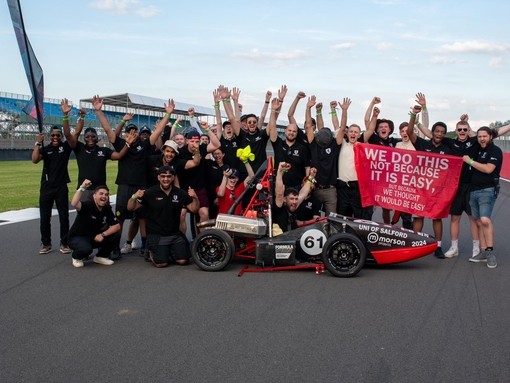
Stories of Innovation: Nurturing skills at the University of Salford’s Esports Lab
Contents
On the surface, it might appear that it’s just a hobby for gamers, but the rising esports sector is creating thousands of jobs every year in everything from logistics to content creation.
As part of our Stories of Innovation series, which spotlights innovative technologies and initiatives that help fuel future economic growth, Morson visited the new Esports Lab at the University of Salford’s Business School to find out how the custom-built facility is providing a platform for students to develop their skills.
Watch the video here:
A global phenomenon
The global esports market is set to generate a global revenue of over £4.5billion by 2028. On the surface, it may seem like merely a hobby, a new form of competition for young people born into a digital age, but outside of the players themselves, the supporting cast from a business sense ranges across disciplines like marketing, design, programming, event management, organisation, and data analysis. With businesses taking note of this growing trend, ensuring the pipeline for this talent remains strong is one of the fundamental reasons behind the University of Salford’s investment in a state-of-the-art Esports Lab, which opened on campus in August 2024.
The purpose-built lab enables the students to have the digital requirements to complete the University and Greater Manchester Institute of Technology’s (GMIoT) Higher National Diploma (HND) Esports Business Management course, which aims to develop skills for students to become industry ready – not just for esports but using their passion for gaming to equip them for the wider world of employment.
Through completing the course, students can branch into traditional business areas like marketing, operations, and logistics, or specialise in unique areas such as casting, broadcasting live tournaments, and creating live content—areas very unique to the esports landscape but also equipping them with broader creative skills useful to many different sectors and industries.
Esports Business Management
Iain Earle is the Program Leader for Esports Business Management at the University of Salford’s Business School. He talks about the rise of esports and the inspiration behind the lab:
“Esports is very much a cultural phenomenon, similar to how fashion was in the ‘60s and music has been. Young people have embraced it, and businesses are taking notice. It’s not going away; it’s something the younger generation will carry into older age, just as previous generations have with music and fashion. Businesses are working to maximise opportunities for themselves and for young people to develop skills in business and content creation, helping the industry grow and evolve.
On the Esports Business Management course, we teach the business of esports and how young future managers can navigate their way around the emerging industry. We don’t focus so much on the playing aspects, although playing is one of the most popular areas.”
The Esports Lab
The lab has been carefully designed and filled with the latest state of the art gaming and digital content creation technology:
“It was designed by one of our tutors, Jake Trotman, who has been engaged in esports for most of his life and has over a decade of industry and player experience. We have a relationship with another esports facility called HOST at Media City, and the same supplier who equipped that facility helped with ours. This amazing space includes features like a transparent brick arch that makes it visually striking and functional, plus VR and AR setups and a podcast suite, all oriented toward future technology.”
Outfitted with a state-of-the-art tournament arena, professional-grade broadcasting gear—including Blackmagic 4K cameras and advanced television studio mixers—as well as an esports suite tailored for teaching, learning, and gaming, the Lab is crafted to empower students eager to make their mark in this rapidly growing, cutting-edge industry.
The Lab also features 23 Yoyotech i9 RTX Esports Gaming PCs equipped with Intel i9 Processors and NVIDIA RTX 4080 Super graphics cards, among other high-end technology. Designed for both instruction and competitive gaming, the Lab’s teaching and six-seat tournament area supports broadcasting and tournaments, while a Formula 1 licensed racing simulator replicates the technology that professional drivers use to train, offering a deeply immersive experience that mirrors an authentic cockpit.
“It’s important for students to learn in an environment similar to what they’ll experience in the industry. My background was in the creative music industry, and 30 years ago, we had new home computers to make our own music, much like young people at the grassroots level do today. There’s a big step up, though, between what’s done at home and what’s done professionally, particularly in terms of content creation and facilities. We developed a space with industry-standard facilities, so students can gain experience with the same tools and environments they’d find in a professional studio or enterprise setting.”
Leveraging emerging trends that interest the young generation is vitally important to securing an engaged pipeline of talent, and we wish the Business School all the best with their programme!
Across the other side of campus in the School of Science, Engineering & Environment, we’ve worked directly with the University of Salford to pave pathways into STEM for all through funding, engagement and training. Find out about the Morson STEM Foundation here















